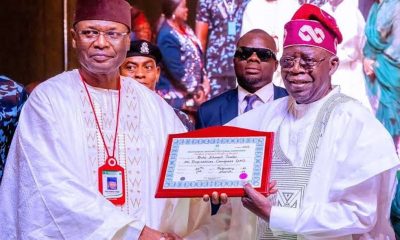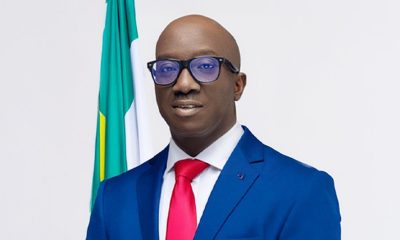Opinion
(Opinion) Oyo Assembly trespasses over illegal suspension of Oyo East LG Chairman
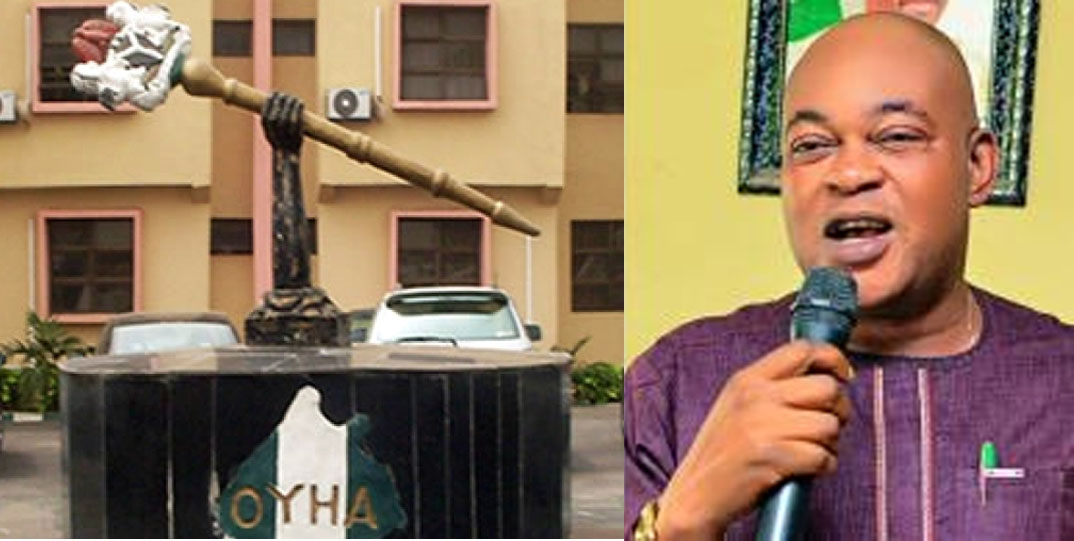
(Opinion) Oyo Assembly trespasses over illegal suspension of Oyo East LG Chairman
Like executive, like legislature in Oyo State, rascality is now the order of the day as Oyo State is now synonymous with illegality and power exuberance. The only Governor which condemned Supreme Court landmark judgment on local government autonomy is the Oyo State fanatical emperor; Governor Seyi Makinde as the Oyo State House of Assembly was reported on Thursday October 31, 2024 to have also suspended the Chairman of Oyo East Local Government, Olusola Oluokun, over a viral video that was purportedly obnoxious and unbecoming of a Chairman of a local government. While the Governor deliberately attacked the Supreme Court judgment to discredit the then Chief Justice of Nigeria who hailed from Oyo State, did the Assembly also want to discredit Alaafin of Oyo Empire symbolizing Yorubaland which Oyo represents?
To be sincere, apart from Ladoja/Akala regime which witnessed thugs’ incursion into Oyo politics, the current administration is the most ruthless that even elevated hooliganism in the State and made thugs of undisciplined people disciplinary committee Chairman of Transport Arms of the terror network. An absurdity of highest order to the Pace Setter State!!!
Actually, the atmosphere in Oyo State House of Assembly since 2019 has shown that the house is either full of political puppets or novice in legislative duties, No wonder, the house members do not even know their limit in law making nor know the laws they are supposed to superintend. There was a day I even asked my own Assembly member from Orelope State Constituency copy of a Law passed when he joined the House but I was surprised that he said he did not have a copy of the bill apart from political brag by telling me he did not know the person he was responding to despite introducing myself formally as usual before making my request. As activist, I did not know more than 65% of people I have attended to their cases. They only got my contact and when they explained their situations, I proffer the solutions where there was no need of seeing me. And once they got result, that is the end. If an honourable has no copy of the law he was part of the makers, do we need to ask them what oversight functions they perform when they do not even know what to do?
READ ALSO:
- You can be charged to court once you’re over 7 years old – Police
- Woman allegedly stabs husband to death in Oyo
- NAFDAC recalls Nivea Deodorant over harmful chemical content
If the House of Assembly is constitutionally informed and literarily exposed, it would have known it is not only illegal for house of Assembly to suspend or sack a local Government Chairman the Same way the National Assembly cannot suspend a Governor or impeach him but that it smears ill of the constituents of that Assembly. The legislative functions of the councilors at the local government include screening and approval of local government budget, nominees of local government chairman such as Supervisors, special assistants and advisers, suspension or removal of local government chairman among others and to conduct oversight functions on the entire local government departments and Units where allocation of resources was made during the financial year. Ohhhh, let me ask Oyo Assembly o, is it the National Assembly that helps you perform your roles? If not, why hijacking the local government administration just because they were selected by you boss?
So, if at all, there is any kangaroo law at the State level which empowers the State Assembly to suspend or sack a local government, that law exposed the mediocrity of those who made it and or implement it as not being sound intelligently in the task of legislative functions. This is because if the National Assembly doesn’t have power to suspend a Governor, the State House of Assembly should know it trespasses and subverts local government administration independence which the Supreme Court has affirmed. Is Oyo Assembly now reversing Supreme Court judgment as a result of power abuse or display of sheer ignorance of the laws?
According to 1999 Constitution of the FRN (as amended), it provides in Section 4 (5) “If any Law enacted by the House of Assembly of a State is inconsistent with any law validly made by the National Assembly, the law made by the National Assembly shall prevail, and that other Law shall to the extent of the inconsistency be void” and section (7) provides “The House of Assembly of a State shall have power to make laws for the peace, order and good government of the State or any part thereof with respect to the following matters, that is to say- (a) any matter not included in the Exclusive Legislative List set out in Part I of the Second Schedule to this Constitution; (b) any matter included in the Concurrent Legislative List set out in the first column of Part II of the Second Schedule to this Constitution to the extent prescribed in the second column opposite thereto” In all of these provisions, the State House of Assembly only has power on revenue allocated to a local government or budget made in respect thereof of any thing having to do with education among similar objects. At no point was any administrative power over local government administration vested in the State House of Assembly. Therefore, the suspension of the Oyo East local government by the Oyo State House of Assembly is ultra vires by the application of Doctrine of covering the veil. Without requiring litigation, the House should reverse itself as quick as possible except it wants to make mockery of itself and the occupants of that House
Luqman Soliu
Abeokuta, Ogun State
(Opinion) Oyo Assembly trespasses over illegal suspension of Oyo East LG Chairman
Opinion
Tinubu, Atiku, and Argentina: United by pain, divided by rhetoric, By Farooq Kperogi

Tinubu, Atiku, and Argentina: United by pain, divided by rhetoric, By Farooq Kperogi
President Bola Tinubu’s Senior Special Assistant on Social Media by the name of Dada Olusegun reportedly said on Thursday that had Nigerians elected former Vice President Atiku Abubakar as president, they would have been sweltering in the same snake pit of torment and economic decline as Argentinians are.
Olusegun’s comment was informed by Atiku’s previous praise for Argentinian President Javier Milei’s economic reforms on February 25, 2024, when Atiku had encouraged Tinubu to emulate the Argentine model.
“Reports have shown how Argentina’s real economy which Alhaji Atiku wants Nigeria to emulate is in severe crisis,” he was quoted to have written on Twitter. “Public debts have reached new highs with the country owing more to the IMF than any other country in the world. Meanwhile, its education sector, manufacturing and construction are collapsing amid rapid deindustrialization. Argentina has $41 billion in credit outstanding, representing 28% of all debt owed to the Fund.”
It’s interesting that the presidential aide painted a dystopian vision of Nigeria’s fate under an Atiku Abubakar presidency by invoking the existential turmoil gripping Argentina under Javier Milei. Yet, delicious irony hums beneath the surface, unseen by Olusegun. President Tinubu’s own economic prescriptions mirror Milei’s policies so closely they might as well be fraternal twins.
Both Tinubu and Milei are champions of punishing austerity. Both are architects of spiraling inflation and social distress. But as the presidential aide warned Nigerians against the imagined peril of emulating Argentina, he entirely missed the reflection staring back from his own political mirror.
He seems blissfully unaware that his cautionary tale is already Nigeria’s lived reality, which is dramatized in the daily hardships and grievances of citizens enduring a spectacle not different from Milei’s Argentina.
In my March 9, 2024, column titled “Rise of Right-wing Economic Populism in Nigeria,” where I tackled Atiku for prescribing Argentina as a model for Nigeria,’ I wrote the following, which is still relevant today:
“Everyone within striking distance of becoming president in Nigeria in 2023 subscribed—and still subscribes—to the consensus that the IMF and the World Bank are inviolable economic oracles that must not be disobeyed, that subsidies must be eliminated and the poor be left to fend for themselves, and that the market is supreme and should be left to determine the value of everything.
READ ALSO:
- Chinese man found with fake diplomatic number plate in Lagos
- Akpabio to sue Natasha for alleged assassination attempt
- Oyo PDP chieftain Adeojo dies, Makinde mourns
“In fact, the other day, PDP presidential candidate Atiku Abubakar put out a press statement titled ‘Argentina’s Javier Milei approach to reforms should serve as a lesson for Tinubu’ where he extolled the dangerously right-wing Argentinian president Javier Milei whose rightwing economic populist policies are destroying the fabric of his country.
“‘I read a recent report in Reuters titled: “Argentina’s market double down on Milei as investors ‘start to believe”,’ he wrote.
“Well, the same Western financial establishment is already praising the outcome of Tinubu’s economic policies. A March 8, 2024, report from Bloomberg, for instance, has said that ‘Foreign investor demand for Nigerian assets surges as reforms instituted by President Bola Tinubu’s administration starts paying off.’
“Similarly, one David Roberts, identified as a former British Council Director in Abuja, bragged the other day that Nigeria’s economy ‘posted a GDP growth of 3.46% in quarter 4’ as a result of Tinubu’s economic reforms.
“He wrote: ‘Why would a country with a severe infrastructural deficit invest more money on a wasteful expenditure such as cheap petrol, instead of building schools, hospitals, dams and a national railway system? It is evident that it had to go.
‘We joined the World Bank and the International Monetary Fund in saying as much to the Nigerian government. And at long last, it is gone.’
“People outside Nigeria reading about Nigeria in the Western financial press would think Nigerians are now living in El- Dorado as a result of Tinubu’s ‘reforms’—just like Atiku thinks a favorable Reuters story about the anti-people economic policies of Milei, who is called the ‘Madman of Argentina,’ is already yielding excellent outcomes.
“If you do the bidding of the Western establishment, they will always make up statistics to show that your economy has grown. I called attention to this in my June 28, 2023, column titled, ‘Why Tinubu’s Hiring and Firing Frenzy Excites Nigerians.
“I wrote: ‘What shall it profit a country when it pursues policies that cause the economy to ‘grow’ but cause the people to growl? After the economy has ‘grown’ but the people still groan, where is the growth? The most important growth isn’t the rise in abstract, disembodied, World Bank/IMF-created metrics but in the improvement of the quality of life of everyday folks.’
“Milei’s Argentina that Atiku is praising is almost in the same right-wing economic hellscape as Nigeria is. Like Tinubu, Milei began his presidency by removing subsidies for petrol and transportation and devaluing the Argentinian peso by more than 50 percent. In addition, he threw scores of workers into unemployment when he reduced the number of ministries in the country.
READ ALSO:
- Bayelsa govt gets court order to stop pro-Wike rally
- Outgone Corps members will get minimum allowance arrears – NYSC
- Natasha dares Akpabio to sue her for exposing assassination plot
“He is so market-centric he scrapped a whole host of rules designed to reign in the greed and exploitation of private enterprises. He did this by getting the parliament to approve the principle of ‘delegated powers’ to the executive for one year, which allows him to rule by decree like a military dictator in the name of ‘economic urgency.’
“The result? Like in Nigeria, most Argentinians are having a hard time finding food to eat. A February 1, 2024, CNN story captures it: “‘I don’t know how I will eat.’ For the workers behind Argentina’s national drink, Milei’s reforms are turning sour.”
“Argentinian workers periodically go on strike to protest Milei’s punishing right-wing policies. On February 28, all flights were cancelled in the country because air travel workers went on a crippling 24-hour strike.
“A March 4, 2024, Bloomberg report said Milei’s policies had caused spending to plunge at shops in Argentina, that firms were seeing double-digit sales declines for third straight month, that the worth of salaries had plummeted amid a paralyzing 250% inflation, and that recession was deepening in the country.
“The lead to the story says it all: ‘Consumers in Argentina are running out of options to shield themselves from runaway price increases as President Javier Milei’s austerity measures send the country deeper into recession.’
“That’s Atiku’s exemplar for Nigeria. Peter Obi is, of course, no different. Tinubu, Atiku, Obi, and in fact Yemi Osinbajo are united in their love for rightwing economics, which invariably leads to an increase in poverty, suffocation of workers, rolling back of welfare for common people, etc.
“In a perverse way, they are actually worse than Buhari because they are self-conscious conservative economic ideologues. Buhari is merely a know-nothing, bungling, kakistocratic power monger.
READ ALSO:
- Fraud rocks FIRS, court orders final forfeiture of Abuja, Kano houses linked to official
- Your time is almost up, military tells notorious bandit leader Turji
- Police recover body of Delta site engineer killed, buried by employees
“The real tragedy is that the vast majority of Nigerians who are ensconced in the narrow ethno-religious political silos built around the personalities of the major 2023 presidential candidates don’t realize that on economic policies, which is what really matters, Tinubu, Atiku, Obi, and Osinbajo are more alike than unlike.
“Sadly, Nigerian leftists, who used to be the bulwark against the dangers of conservative economic totalitarianism, have either been coopted or silenced. Only Femi Falana, Majeed Dahiru, I, and a few others consistently stand up to the forces of economic conservatism.
“This state of affairs will ensure that Tinubu’s successor will be another neoliberal ideologue who will bludgeon his way to the presidency using religion and ethnicity as cudgels. When he deepens the misery he inherits, he will blame his predecessor for not being a faithful practitioner of the neoliberal gospel. His own successor will replicate his template.
“After three terms of this right-wing baloney, Nigeria will be irretrievably gone. The time to pivot from the IMF and the World Bank and to reject everyone who is their poodle is now.”
Because Tinubu’s presidential aide is shielded from the biting aftermath of his principal’s cruel economic policies, he imagines that Nigeria is different from Argentina. He is deluded. He lives in an alternate, sequestered reality.
Just as Tinubu’s swift removal of petrol subsidy and his devaluation of the naira set off inflationary shockwaves that hit millions of households in Nigeria, Milei’s shock therapy, which also involves subsidy cuts, currency plunge, and fiscal austerity, has exacerbated hyperinflation and unemployment, caused more than half the population to teeter below the poverty line, and provoked social unrest.
In both Nigeria and Argentina, the middle class has been squeezed: many who were managing to live decent lives have slid backwards because soaring prices and job losses, undermining the very social fabric needed for a stable economy. Tinubu’s Nigeria and Milei’s Argentina present a distinction without a difference.
Tinubu, Atiku, and Argentina: United by pain, divided by rhetoric, By Farooq Kperogi
Farooq Kperogi is a renowned columnist and United States-based Professor of Journalism.
Opinion
How Wande Abimbola rejected IBB’s ING bait, and other stories (3)

How Wande Abimbola rejected IBB’s ING bait, and other stories (3)
Tunde Odesola
(Published in The PUNCH, on Friday, April 4, 2025)
Abimbola’s eyes had seen 999 battles; so, one more battle would not make him go blind. Having survived a milestone of battles, it was natural for Abimbola to deploy his greatest weapon, Ifa, to prosecute the students’ battle that raged during his tenure as vice-chancellor of the University of Ife.
The Babalawo’s eyes had seen many òkun (oceans) and countless òsà (lagoons), so he would not panic at the sight of isún (springs). Wande had fought many wars, yet he remained unbowed, standing on the rock of truth.
In the military years of the 1980s, vice-chancellors of federal universities were statutorily entitled to a first term of four years and, if reappointed, got a three-year second term.
In Abimbola’s seven years of vice-chancellorship (1982-1989), Great Ife witnessed giant strides, such as the purchase of a $1.2bn first-in-Africa accelerator for nuclear research energy and medicine – bought from France in 1986; establishment of 23 linkages with various world-class citadels of knowledge, maintaining peace and tranquility among staff and students, and supporting teaching, research and development.
“The university had a bank account in New York and an office in the UK, manned by whites. When an official of the university visited a university in the UK or our students went for exchange programmes, they– white officials employed by Ife– were the ones who saw to protocols, arranging for hotels, etc. It was a liaison office where those inquiring about our university could go and make inquiries. We had lots of money in the university’s accounts in the UK and New York City.
“But, in line with a Federal Government directive that later emerged and forbade public institutions from running foreign accounts, Education Minister, Prof Jubril Aminu, said we should close down the account and all the money in the account was moved through the education ministry to Federal Government’s account in 1986,” Abimbola said.
READ ALSO:
- South African court acquits Nigerian pastor of rape after 8 years in jail
- Man jailed 3 months for non-declaration of $30,000 at airport
- More heads to roll in NNPCL, subsidiaries as Ojulari assumes office
In the same year, an external battle spilled over to Great Ife when Ife students, in solidarity with their Ahmadu Bello University colleagues, planned to embark on a protest called Ango-Must-Go.
Agronomy expert, Prof Ango Abdullahi, was the vice-chancellor of ABU, whom protesting students accused of callousness, following an increase in school fees, among many other allegations. Abdullahi had reportedly invited the police to quell a peaceful protest, an authoritarian action, which some newspapers said resulted in the rape, maiming and killing of students and non-students by the police.
A slew of Western press, including BBC, Voice of America, The Washington Post, Chicago Tribune, etc. reported in 1986 that many lives were lost to the ABU riot, with Nigerian newspapers lamenting, “Abdullahi expressed no regrets inviting the police,” and that he said, “only four people died.”
Currently, Abdullahi is a Commander of the Order of the Niger (CON deleted) and he holds the Magajin Rafin Zazzau traditional title. He is 86 years old.
Abimbola said, “Higher institution students from all over the country had gathered in our university. They wanted to hold the mother of all rallies because some of their colleagues had been killed by the police in ABU, Zaria.
“Security reports showed that the external students were in their thousands and had joined forces with our student population that numbered up to 30,000 because Moore Plantation, Ibadan; Adeyemi College of Education, Ondo; and the Institute of Agriculture, Akure, were part of UNIFE then.
“The students were charging themselves up all through the night, singing, dancing and drinking, preparatory to a grand protest the next morning. The fear of the unknown gripped the university community because nobody could predict what the external students could do, but we know our students were not destructive.
“I consulted Ifa, and Ifa told me what to do. In the middle of the night called óru ògànjó, I did what Ifa told me to do. Subsequently, loud and strange sounds reverberated through the university, sending shivers down the spines of the students who stopped singing and dancing, with the foreign students fleeing the campus as early as 5 a.m., while our students ceased all protest activities and went back to class. I am a lover of freedom of expression and association, but I could not leave the university community at the mercy of the foreign students, who could have wreaked havoc because they did not know the Ife tradition of protest.”
READ ALSO:
- Barcelona beat Atletico to set up cup final against Real Madrid
- NNPCL hikes petrol pump price to N950/litre
- Liverpool leap closer to title with narrow Everton win
So, I asked Awise Agbaye if African traditional bulletproof could stop AK-47 bullets. “No, it cannot,” Abimbola said. Abimbola’s response was in tandem with the answer given by the Araba of Osogbo, Chief Ifayemi Elebuibon, whom I had asked the same question some time ago.
In my article, “Can African bulletproof stop AK-47 bullets?”, published in The PUNCH, on January 18, 2021, a former Military Administrator of Lagos State, Brigadier-General Olagunsoye Oyinlola, said no African traditional bulletproof can stop bullets from AK-47 rifle, a position which pan-Yoruba activist, Sunday Adeyemo, aka Sunday Igboho, opposed, saying he had ‘authentic’ African traditional bulletproof that could stop AK-47 bullets. The Ooni, Oba Adeyeye Ogunwusi, also said in a telephone interview with me that ‘ayeta’ could stop bullets from an AK-47.
However, Oyinlola, who fought in the Chadian crisis of the 1980s and (also deleted) led Nigeria’s contingent to the United Nations’ peacekeeping mission in Somali in the early 1990s, said, “In the dane guns that masqueraders use in deceiving people, it is the gunpowder in them that explodes, they have removed the balls in the guns. As for soldiers missing their target when shooting at armed robbers tied to stakes, you must realise that it is not easy to kill a fellow human being.
“Some of the soldiers are newly recruited. Some shut their eyes and shoot up. There was a time that the officer commanding the shooting had to kick out one of the soldiers because he was closing his eyes and shooting up. If it was ‘ayeta’ that made bullets not penetrate the robbers’ bodies initially, why did they die eventually?”
Despite being armed, Sunday Igboho and some of his men fled when the democratic dictatorship of former President Muhammadu Buhari sent AK47-wielding killers in DSS uniform after him in his Ibadan home at night, following his strident condemnation of the widespread killing of Yoruba farmers by Fulani herdsmen in the South-West. One of Igboho’s men, who had charms all over his body, was killed and his corpse taken away by the killer DSS men.
READ ALSO:
- Protect vulnerable Nigerians, IMF tells Tinubu
- Ex-NYSC DG Tsiga regains freedom after 56 days in captivity
- Notorious bandit leader Bello Turji goes berserk, kills 12 to celebrates Eid
In an interview with me, Abimbola recalled that French soldiers cut off the charmed bracelets, amulets, gourds and cowries that Nigerian volunteers to WW1 had on their bodies.
Recounting how his father enlisted in WW1, Abimbola said, “ My father was playing ‘ayò olópón’ with six others in Oyo when the town crier came and announced the war. From the ayò game, they all voluntarily went to the palace and were enlisted to fight on the side of France in Cameroon between 1914 and 1916. This was when European allied forces were fighting Germany and taking over Germany-colonised territories worldwide during the fallout of WW1. Germany had colonised portions of Cameroon, which France took over during the war.
“The coalition took back all the African territories controlled by Germany. The countries include Tanganyika, now Tanzania, Rwanda/Burundi, Namibia, Cameroon and Togo. When I went to France in 1986 to purchase the accelerator, I told French authorities that my father fought on the side of France during WW1, they collected my father’s name, and the next day, they came and told me it was true, saying I could apply for French citizenship on account of my father’s participation in the war. But I did not.
“It was my grandfather, Akinsilola, nicknamed Légbejúre (fàdá owó è pa ìjàkùmò), who led Oyo warriors to Ijaye, while Ogunmola led Ibadan warriors to Ijaye during the Ijaye War, and both forces levelled Ijaye. The late Alaaafin, Oba Lamidi Adeyemi, used to recite the panegyrics of the Oyo warriors who went to the Ijaye War, affirming my grandfather’s leadership of the Oyo forces. Unfortunately, I did not document the late Alaafin’s account.”
When the Nigerian Civil War broke out, Abimbola’s father and his younger brother, who also fought in WWI, urged Abimbola to enlist for the war.
“I wished to go. But I was writing my PhD thesis then. If I had completed my PhD, maybe I would have gone to the civil war,” he said.
Extolling moderation, humility, contentment and truth as virtues for longevity, Abimbola said he rejected plots of land someone gifted him in Lagos when he was VC, adding that the only house he owned was his father’s house in Oyo, which he remodelled as advised by his father.
Abimbola, who has 17 children, including three sets of twins, revealed that he never attained the only position he struggled to get, which was the governorship of Oyo State.
“1975 was the last time I drove a car. As VC, I had a total of five cooks and stewards, and there were 18 vehicles in the fleet, including a Peugeot 504 and two Mercedes-Benzes. I never rode the Mercedes-Benz because I knew I could not maintain such a lifestyle after my tenure. I only rode the Peugeot. The 18-car fleet was for the operation of our linkages, too,” Awise said.
* Concluded.
Email: tundeodes2003@yahoo.com
Facebook: @Tunde Odesola
X: @Tunde_Odesola
Opinion
Barbaric mass burning of innocents in Edo, by Farooq Kperogi

Barbaric mass burning of innocents in Edo, by Farooq Kperogi
I woke up on Friday morning to a deluge of forwarded, unwatchably terrifying videos showing 16 Hausa hunters, who were traveling from Port Harcourt to Kano for the forthcoming Eid-el-fitr festivities, being lynched and burned alive by a mob of blood-thirsty savages in the town of Uromi in Edo State. I’ve been sick to my stomach.
My inquiry has led me to understand that the Uromi community has been gripped by abductions for ransom, which sometimes result in deaths. Seething with rage and vengeance over the incessancy of deadly kidnapping by “Fulani herdsmen,” the community was primed for jungle justice.
When local vigilantes accosted a bus traveling northward through the town, they found Hausa hunters armed with hunting guns and machetes aboard. In the bigoted, know-nothing estimation of the Uromi vigilantes, Hausa hunters were one and the same as Fulani kidnappers.
So, they burned the innocent Hausa hunters for the crimes of anonymous Fulani bandits. I honestly couldn’t bring myself to watch the dreadfully nightmarish videos to the end.
These sorts of savage slaughters of innocents persist in Nigeria not just because of a progressive loss of faith in formal institutions for the redress of communal grievance, heightened anxieties about safety, and increasing faith in the efficacy of jungle justice but also because of the absence of consequences for them.
As I pointed out when Deborah Yakubu was extrajudicially murdered by a mob of unhinged fanatics in Sokoto in May 2022, there is no greater enabler of jungle justice than a lack of consequence for it.
Sadly, when tragedies like this occur, there is a habitual, safe, standard, prepackaged rhetorical template that people in government effortlessly regurgitate. They promise to bring the perpetrators to justice, make performative arrests to quench public thirst for justice, and nothing else happens. That can’t continue.
When I called for the prosecution and public execution of the murderers of Deborah in 2022, I warned that it was necessary “to serve as an example to other would-be murderers.”
READ ALSO:
- Investigation of wanted businesswoman Achimugu not linked with Atiku, Sanwo-Olu – EFCC
- No Sallah durbar festival in Kano this year – Police warn
- $100m coin collection buried for decade to be auctioned
Of course, Deborah’s murder wasn’t the first example of jungle justice. Harira and her four children were ferociously murdered by maniacal thugs in Anambra State, and nothing was done about it. The list is too long to fit in a newspaper column. But I argued that it’s never too late to do the right thing.
I will repeat my plea. The murderers of these innocent travelers are easily identifiable from the videos that are circulating online. They should all be apprehended, tried, and executed in public to deter a repeat.
But, in the interest of proportionality of justice, this should not be limited to this Uromi incident. All cases of jungle justice should equally be punished the same way. The punishment for murder in both the Criminal Code and the Penal Code is death. The law should be followed.
Another thing that this incident instantiates is the danger of toxic ignorance. Before Muhammadu Buhari became president, all northerners in southern Nigeria used to be “Hausa,” irrespective of their ethnic and religious identities.
After Buhari became president, every northerner, especially if the northerner is also Muslim, became “Fulani,” which led me to write a June 5, 2021, column titled, “‘Fulanization’ of the North by the South.” The South, I wrote, was relentlessly rhetorically Fulanizing the North, particularly the Muslim North, just to fertilize and sustain a simplistic narrative.
This simplistic, misbegotten narrative probably led the Uromi mass murderers to assume that Hausa people with hunting instruments must be Fulani bandits since they have internalized the wrongheaded notion that all northern Muslims are “Fulani.”
Never mind that Hausa and Fulani communities in many northwestern states are at daggers drawn over kidnappings for ransom by Fulani outlaws, or that more northerners are kidnapped for ransom than people anywhere else in the country.
Trust TV, the broadcast arm of Daily Trust, did an informative documentary on March 5, 2022, titled “Nigeria’s Banditry: The Inside Story” that brought the tension between Fulani herders and Hausa people into focus.
A subsequent July 25, 2022, BBC Africa Eye documentary titled “The Bandit Warlords of Zamfara,” which got the hackles of the Muhammadu Buhari administration up, amplified the tensile relational dynamics between Hausa and Fulani communities in the northwest since kidnapping for ransom took roots in the region, transmuted into full-on terrorism, and finally morphed into the full-scale Hausa-versus-Fulani ethnic war, particularly in such states as Zamfara, Kebbi, and Katsina.
In response to the rural and urban banditry by mostly Fulani brigands against Hausa people in the northwest (Fulani people have also accused Hausa people of cattle theft, indiscriminate murders, and systematic exclusion), the BBC documentary tells us, Hausa people formed or strengthened preexisting vigilante groups called yan sakai or yan banga for self-defense against bandits.
READ ALSO:
- EFCC re-arraigns son of ex-PDP chairman for alleged N2.2bn oil subsidy fraud
- Group says Natasha’s recall will deepen democracy
- We welcome Gov Makinde’s U-turn on Shari’ah panel – MURIC
Yan banga groups originally come from traditional Hausa hunters’ associations and draw upon the skills and rituals commonly associated with traditional hunters (such as using charms, dane guns, and other traditional weaponry) for vigilante duties.
In other words, most of the Hausa hunters that the Uromi homicidal beasts murdered in cold blood to avenge the banditry of Fulani herders would be targets of elimination by Fulani bandits in the northwest. That’s double jeopardy.
The northwest is the theater of a ceaseless spiral of recrimination and reciprocal violence between the Hausa and Fulani communities, thereby imperiling the longstanding, Islamically-inspired ethnocultural synthesis that historically unites them.
Remarkably, this volatile dynamic persisted largely unnoticed by both national and global media until it was thrust into international consciousness through BBC Africa Eye’s seminal July 2022 “The Bandit Warlords of Zamfara” documentary.
The documentary revealed the paradoxical reality wherein, despite substantial overlaps in culture, religion, heritage, and linguistic traditions, the Hausa and Fulani populations remain predominantly segregated, particularly in rural areas. Intercommunity relations are characterized by persistent tensions that manifest in conflicts over scarce resources such as land, water, and sustenance.
But the rest of Nigeria has a hard time grasping the existence of tensile ethnic stress between Hausa and Fulani people in the north on account of banditry because the southern-dominated institutional news media in Nigeria, which help frame how we make sense of our social and cultural realities, lack ready-made, stereotypical mental representations with which to frame the conflict, so they either avoid reporting it altogether or minimize its horrors if they report it at all.
The news media thrive on Manichean binaries, conflictual differences, and sensation, which a conflict between Hausa and Fulani people doesn’t present. After all, a popular Yoruba epigram says, “Gambari pa Fulani ko lejo ninu,” which roughly translates as “If a Hausa person kills a Fulani person, there is no case,” implying that the Hausa and the Fulani are indistinguishable.
I have also read many northerners on social media encouraging a retaliation over the Uromi massacre of Hausa hunters. That would be most unfortunate for at least three reasons. First, the people who committed the murders are easily identifiable. Indiscriminate murder of innocent southerners in the north for a crime committed by a recognizably small group of people violates not just the law of the land but also Islamic precepts.
Surah Al-Ma’idah (Chapter 5, Verse 32) of the Qur’an says, “whoever kills a soul…it is as if he had slain mankind entirely. And whoever saves one—it is as if he had saved mankind entirely.”
Second, based on the experiences of the past, one can almost guarantee that innocent, law-abiding Igbos in the north would bear the brunt of any “retaliation” even though Uromi in Edo State isn’t an Igbo town.
The town is populated by the Esan people who, although they constitute a major ethnic group in the state, are not the majority in the state. They also don’t have a numerically significant presence in the North, so innocent southerners would be murdered in cold blood.
Finally, killing innocent southerners in the North for the crimes of a few people would be identical to the crimes of the Uromi vigilantes that the retaliators are supposedly avenging.
I hope the president and the governor of Edo State will act expeditiously to contain this upheaval and prevent it from snowballing into a bigger problem than it should.
Barbaric mass burning of innocents in Edo, by Farooq Kperogi
Farooq Kperogi is a renowned Nigerian columnist and United States-based Professor of journalism.
-
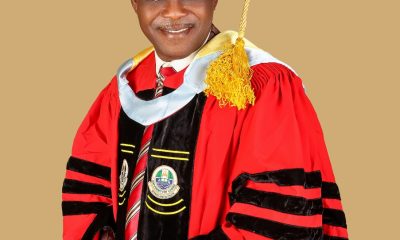
 Education2 days ago
Education2 days agoErudite mass comm lecturer Oscar Odiboh becomes full professor at Delta State University
-

 Entertainment3 days ago
Entertainment3 days agoA colleague raped me, Actress Lolo 1 alleges
-
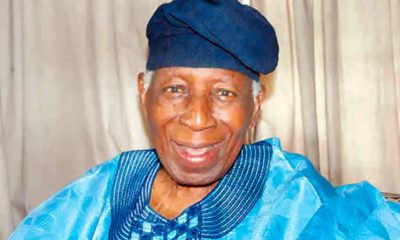
 metro2 days ago
metro2 days agoBreaking: Former Oyo governor Olunloyo dies at 89
-

 International3 days ago
International3 days agoTrump: VOA goes off air in Nigeria, Ghana, others
-

 metro2 days ago
metro2 days agoNurse leaves US, seeks new life in Nigeria, says everything not money
-

 Health3 days ago
Health3 days agoPoisonous fluorides in toothpaste: Pharmacists counter televangelist’s claims
-

 Politics2 days ago
Politics2 days agoBREAKING: Nickolas Ukachukwu defeats Ozigbo to win Anambra APC gov ticket
-

 metro1 day ago
metro1 day agoHeavy gunfire in FCT, police recover stolen cars, suspects arrested



